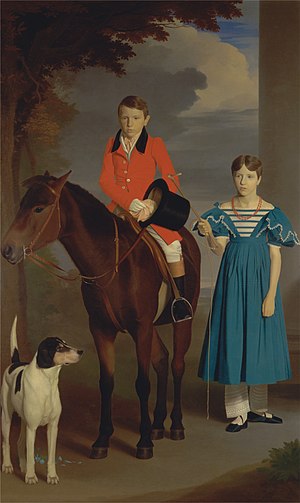| John Gubbins Newton and His Sister, Mary Newton | |
|---|---|
 | |
| Artist | Robert Burnard |
| Year | 1833 (1833) |
| Type | Oil painting |
| Dimensions | 235 cm × 143.5 cm (93 in × 56.5 in) |
| Location | Yale Center for British Art, New Haven |
| Coordinates | 41°18′29″N 72°55′50″W / 41.307954°N 72.930693°W / 41.307954; -72.930693 |
| Owner | Yale Center for British Art |
John Gubbins Newton and His Sister, Mary Newton is an 1833 painting by Robert Burnard. It is now in the Yale Center for British Art, as part of the Paul Mellon collection, where it has the accession number B2001.2.66.
Description
The painting, a full-length portrait, shows John Gubbins Newton on a horse, with his sister, Mary Newton, beside him. At the time of the painting, John was six years old and Mary was ten years old. Judy Egerton wrote that there is nothing remotely like it in English portraiture of the second quarter of the nineteenth century. Grace Glueck described it as "a little-known dazzler".
Attribution
The painting has been attributed to at least three painters. In 1963, Basil Taylor attributed the painting to Jacques-Laurent Agasse. In 1978, Judy Egerton attributed the painting to Scottish portrait and history painter John Zephaniah Bell. When the portrait was cleaned by Lance Mayer for the 2001 exhibition, The Paul Mellon Bequest: Treasures of a Lifetime, a signature ('R. Burnard pinxit') was discovered in the foliage in the upper left corner of the painting. On the basis of the signature, the painting was attributed to Robert Burnard.
Provenance
John Gubbins Newton and Mary Newton were the only children of John Newton of Devon. The painting stayed at the Newton’s Millaton House for over a hundred years until 1955, when it was bought by J. Andrews, of Tavistock, Devon. Then it was bought by Cyril Steal who sold it to Jeremy Maas in 1961. Later that same year, Paul Mellon bought it. The painting remained in Mellon's house in Upperville, Virginia until 1999, when it was moved to the Yale Center for British Art in New Haven, Connecticut.
References
- "Holdings: John Gubbins Newton and His Sister, Mary Newton". Collections.britishart.yale.edu. Retrieved 2011-05-16.
- ^ Trumble, Angus. Who was Robert Burnard? Apollo Magazine, Ltd. Sept 2004 v 160 i511 P84-9.
- ^ Judy Egerton, Spun in Art and Books. The Paul Mellon Collections: British Sporting and Animal Paintings, 1655-1867, London, 1978
- JOHN GUBBINS NEWTON AND HIS SISTER, MARY NEWTON by ROBERT BURNARD By Jennifer A. Wheeler For Sense and Sensibility: Art in Europe 1750-1850, May 2006
- Glueck, Grace (2007-04-20). "An Anglophilic Yankee Aristocrat and His Finds Across the Pond". The New York Times.
- "Holdings: Author Search Results". discover.odai.yale.edu/. Retrieved 2011-05-01.
- Basil Taylor, 'The Intimate English Portrait', APOLLO, vol. LXXVII, no. 14 (April 1963), p. 276 (and plate 11 in color)
- Malcolm Warner: The Paul Mellon Bequest: Treasures of a Lifetime New Haven, CT, 2001, p. 61.
- Paul Mellon's Legacy: A Passion for British Art : Masterpieces from the Yale Center for British Art. 2007. p. 291-292.
External links
- JOHN GUBBINS NEWTON AND HIS SISTER, MARY NEWTON by ROBERT BURNARD
- Who was Robert Burnard? by Agnus Trumble